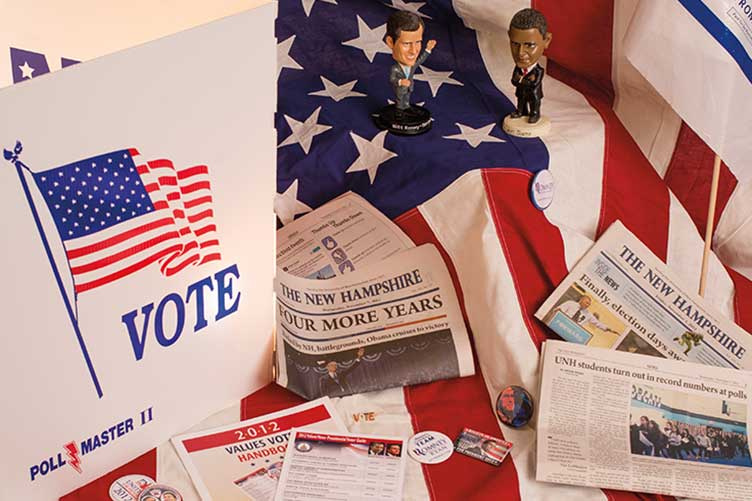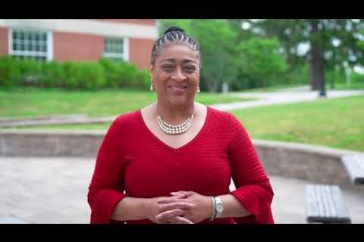
On Election Day 2012, the line of people waiting to register and vote at Durham’s Oyster River High School snaked down long hallways and around corners, doubled back on itself and straggled out the front door. Every time the line shrank, or so it seemed, a shuttle bus from the UNH campus would drop off a fresh load of students, and soon the line would be another 50 or 60 voters long. More than 3,000 new voters registered at the Durham polls that day, the vast majority of them UNH students, who chatted with friends, snapped photos with their cellphones and waited patiently to cast their first-ever ballots in a national election. Despite a last-minute panic over a shortage of voter registration forms, the atmosphere at the high school was welcoming and festive. Some students even sent out for pizza. It was a party in line,” says Ann Shump, who as Durham’s supervisor of the checklist is responsible for same-day voter registrations. “They had pizzas being delivered in the hallway.”
Elections in Durham haven’t always run so smoothly. In fact, the right of college students to vote where they attend school has been fiercely disputed since 1971, when the 26th Amendment to the U.S. Constitution lowered the voting age from 21 to 18. New Hampshire — which offers same-day voter registration and hosts the earliest presidential primary — has been a flashpoint ever since.
“There’s this idea that students don’t have this long-term commitment to the communities they live in,”says Sarah Fearon-Maradey ’14G, who wrote an article for the UNH Law Review on efforts to disenfranchise college students. “There’s this idea they’re too Democratic, when actually they vote pretty similarly to the general populace. And there’s this idea that they lack maturity and can’t vote responsibly.”
The first New Hampshire skirmish over college student voting occurred less than a year after the 26th Amendment’s passage, when Dartmouth student Frank Newburger III, originally from Hawaii, tried to register at the Hanover town offices. Officials asked Newburger if he planned to leave the state after graduation, and when he answered “yes,” they refused to let him register. Stunned, Newburger sued on behalf of all New Hampshire college students, arguing the state constitution gave him the right to vote where he was “domiciled,” or lived most of the year. Town and state officials countered that only legal residents — people with an “indefinite intention” to remain in New Hampshire — could register and vote.
The U.S. District Court in Concord ruled in Newburger’s favor in June 1972, but that hasn’t stopped state legislators, the political parties and town clerks from trying to curtail student voting ever since. They have challenged students trying to register, blanketed campuses with pamphlets and tried to redefine residency to exclude out-of-state students. Those efforts picked up steam in the late 1990s, when New Hampshire — once reliably Republican — became a swing state. Durham, home to the largest college population in the state, found itself squarely at the center of the debate.
“Durham is always a hot spot because you do have a fluid population here,” says Andy Smith, associate professor of history and director of the UNH Survey Center. “The story is always that the election is rigged (and) it usually comes from Republicans, because students are thought to vote Democratic.”
“There’s this idea students are too Democratic, when actually they vote pretty similarly to the general populace. And there’s this idea that they lack maturity and can’t vote responsibly.”
— Sarah Fearon-Maradey ’14G
Hostilities escalated during the neck-and-neck 2000 contest between Vice President Al Gore and former Texas Gov. George W. Bush. Republicans passed out flyers warning out-of-state UNH students that if they voted in New Hampshire, they could lose scholarships, health insurance or car insurance based on their legal residency in another state and asserting that they would be obliged to register their cars and obtain driver’s licenses here. Town officials told students the same thing on Election Day, and Republican lawyers at the polls challenged nearly every out-of-state student trying to register. The Democrats responded by sending their own lawyers, and ultimately, the state attorney general’s office was called in to referee.
Fearon-Maradey remembers seeing similar leaflets as a Dartmouth freshman in 2002. The pamphlets made her afraid to register and vote in Hanover, because she thought she might lose her health insurance and some of her financial aid. She registered in Vermont and voted absentee. “I remember being very confused,” she says. “I was a first-generation college student and my parents had never been that involved in the political process.” By the time she got to UNH School of Law, though, she knew her rights — and was able to counsel other out-of-state students on registering and voting in New Hampshire.
In Durham in 2002, the Democratic Party fought back, stationing lawyers and notaries stood outside the polls to help students fill out affidavits swearing they lived in town. When the students erroneously listed their Granite Square Station (GSS) mailboxes and town officials asked them to fill out new affidavits showing their street addresses, the lawyers accused them of intimidating the students. Adding to the tension, Durham’s town clerk at that time did not think college students should vote there unless they were permanent, full-time residents, fearful they would overwhelm local government. Such fears are generally groundless, at least in New Hampshire, Smith says: Few college students attend local town meetings or elections, which are held in the spring, separately from state and national elections. “The students are really only coming out and voting in presidential elections,” he says.
Meanwhile, at the State House, Republicans and Democrats spent a decade debating language on voter registration forms that said new voters were required to obtain a New Hampshire driver’s license and car registration within 60 days. William O’Brien, the New Hampshire House Speaker in 2011 and 2012, told a conservative group the language was necessary because college students were “doing what I did when I was a kid and foolish: voting as a liberal.” College students, he said, “lack experience” and “vote their feelings.”

Five out-of-state UNH students and two at other schools sued, arguing the language contradicted state law and the Newburger ruling by telling new voters they had to become permanent state residents. (They also noted that if out-of-state UNH students became state residents, they’d be entitled to in-state tuition, with devastating consequences for the university’s budget.) The students’ lawsuit was joined by Durham resident Joan Flood Ashwell, the election law specialist for the nonpartisan League of Women Voters, who said the form was confusing and that she didn’t know what to tell prospective voters — not only college students but military personnel and other workers living only temporarily in the state.
A Strafford County Superior Court judge agreed and ordered the language removed before the 2012 general election. Another judge issued a permanent injunction in 2014, and the state Supreme Court upheld it this past May.
The upshot of those and other battles is that today, students at UNH and other New Hampshire colleges have greater legal protections. A 2009 state law explicitly gives students the right to vote where they live while attending school, and although the state has a new voter ID law, town clerks must accept college IDs from voters requesting a ballot.
Towns also have the discretion to accept a wide range of photo IDs and proofs of domicile when registering new voters. Durham now lets UNH students, faculty
and staff use their university IDs to prove identity, and they can show any piece of mail sent to their physical address to prove domicile — “even a birthday card,” Shump says. Dorm dwellers with GSS mailboxes can show a letter from their RAs saying they live in a particular residence hall, or fill out an affidavit. Nowadays, Durham election officials “bend over backwards to make sure everyone who’s eligible to vote can vote,” Ashwell says.
State lawmakers keep coming up with new wrinkles, though. The GOP-majority Legislature passed a bill earlier this year requiring voters to live in New Hampshire for 30 days prior to registering in an effort to prevent “drive-by voting,” especially by short-term campaign workers who flock to New Hampshire before every major election to help with canvassing, phone-banking and voter registration drives. Gov. Maggie Hassan vetoed the bill, however, and the Legislature failed to override her.
Not all Republicans support restrictions on student voting, of course. The present House speaker, Hudson Republican Shawn Jasper ’89, who served several terms on the House Election Law Committee, calls the idea of prohibiting college students from voting where they live “ridiculous.” And Durham town moderator Chris Regan notes that in the 2014 midterm elections, vanloads of fraternity brothers turned out to vote for Republican Scott Brown, who ignited student enthusiasm for his challenge to U.S. Sen. Jeanne Shaheen by wading into the student tailgating party at homecoming.
Because there’s no incumbent in either party, Regan predicts big crowds across the political spectrum for the 2016 presidential primaries, and even bigger crowds in next November’s presidential contest. Shump plans one or two voter registration events on the Durham campus before the primaries and another two or three before the general election, in hopes of reducing long lines at the polls.
Fearon-Maradey welcomes the new protections for student voters. “When you’re in college is when your interest in politics starts to perk up and you start to become engaged,” she says. Student voting also benefits society as a whole, she says, because studies show that people who vote within a couple of elections of turning 18 are much more likely to become regular voters as adults.
But the Survey Center’s Smith says student voting rights will remain a political football as long as New Hampshire is a swing state. “Political parties are always complaining either that students are being prevented from voting or that they’re voting illegally,” he says. “The parties make a big deal about it to make political hay. Especially if your party’s going to lose the election, you want a reason to blame it on, other than your party’s candidates or your ability to get the vote out.”
Originally published in UNH Magazine—Fall 2015 Issue
-
Written By:
Katharine Webster | freelance writer



















































